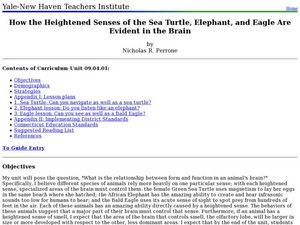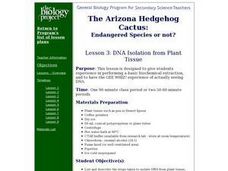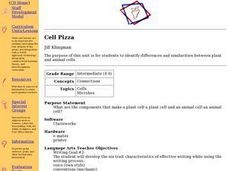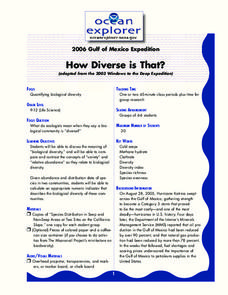Curated OER
How the Heightened Senses of the Sea Turtle, Elephant, and Eagle Are Evident in the Brain
Students explore the senses of different animals. For this biology lesson plan students will study the animals selected for their grades. The students will learn about the brain and how the senses of that animal have developed.
Curated OER
Electrophoresis Analogy
High schoolers participate in a simulation of electrophoresis separation of DNA fragments. They link arms to form DNA fragments with each student representing a nucleotide. As they move through an obstacle course they discover how...
Curated OER
DNA Isolation from Plant Tissue
Students perform an experiment to extract and observe DNA from plant Tissue. They read about the procedure and relate it to the procedure used to isolate DNA from an endangered plant species. This is lesson three in a nine lesson unit...
Curated OER
The Teaching of Biology and Difference
Seventh graders pretend they were Anton looking through the microscope for the first time. They describe the way he felt when he observed tiny moving objects in the sample of pond water. They look at their own samples of pond water,...
Peace Corps
Family
Family traditions are the focus of a instructional activity that explores the lives of children in India and those in your classroom. Scholars examine their own family roles and traditions, then respond to an informative text detailing a...
Illustrative Mathematics
How Many Cells Are in the Human Body?
Investigating the large numbers of science is the task in a simple but deep activity. Given a one-sentence problem set-up and some basic assumptions, the class sets off on an open-ended investigation that really gives some context to all...
University of Colorado
Punnett Squares with Piebald Deer
Explore the science behind Earth's amazing diversity of life with this lesson plan on genetics. Looking at specific traits in piebald deer, carnations, and roan cattle, young scientists use Punnett squares to determine the possible...
Florida International University
Design Your Own
Apply scientific principles to designing an experiment to study organisms living on the coral reef in our oceans. Through reading, individuals learn about the coral reef ecosystem and important factors that affect its function. Using the...
Channel Islands Film
Island Rotation: Lesson Plan 4
Foster's Rule? Allopatric speciation? After watching West of the West's documentary Island Rotation, class members use Venn diagrams to compare endemic species on the Channel Islands with mainland related species. They then create a...
Curated OER
Pseudogene Suite
Students use Biology Workbench to explore DNA sequence data for the GULOP gene in humans, chimpanzees, orangutans, and crab-eating macaques and the beta globin gene and its pseduogene in humans, gorillas, and chimpanzees.
Curated OER
Cell Pizza
Students identify parts and functions of microscope. Students watch video, Cells and Life about cell parts with actual pictures and actual cells. Students discuss video and identify parts of the cells that animals and plants have in...
Curated OER
Animals and Plants of BC's Rocky Shore
Students fill out a fact sheet and look at diagrams of BC's shore and the animals that live there. In this habitat lesson plan, students discuss the plants and animals and the different zones they live in.
Curated OER
Draw an Alien in Natural Habitat
Students apply prior knowledge of living things, structures of living things and how living things sense and respond to their environment. In this habitat lesson, students review the basic needs of organisms to survive. Students create...
Curated OER
Pair the Plants: An Introduction to Scientific Names
Students examine why plants have both common and scientific names, then complete the activity by matching each common plant name with its scientific name. They finish by working in cooperative groups to create an ABC of Plants class book.
Curated OER
Community Cell
Students explore parts and functions of the cell, and create models of assigned organelles.
Curated OER
How Diverse is That?
Students discuss biological diversity in ocean communities. In this diversity lesson, students examine the variety of organisms compared to relative abundance. They will write an analysis and discuss their findings with the class.
Curated OER
Biospheres in Your Backyard
Students collect data from a local river biome. They use the information for metric conversion and graphing equations. They study the components of what makes up a biosphere and how math is used to analyze one.
Curated OER
Teaching Biology Through Problem-based Activities
Students plant seeds and observe the life cycle of the organism. They experimentally research the effects of radiation on seed growth. Students determine the effects of environmental pollutants on harvested seed.
Curated OER
Habitat Unit - Day 2
Learners explore abiotic factors that affect habitats. After a class lecture, students work in groups to answer questions about plant tissue, production and growth. They share answers, complete a crossword puzzle, and create a habitat...
Curated OER
Lesson 3: Understanding Population Growth
Students explain population growth in Maryland and its relationship with age structure, household growth and consumption of land.
Curated OER
Fisheries Project
Students explore biology by completing a fishing worksheet. For this commercial fishery lesson, students identify the process of taking mass fish from the ocean and delivering them to eateries while discussing the negative aspects....
Curated OER
Disease and Epidemics
High schoolers explore how the study of diseases, epidemics and disease management offers opportunities for exploration of biological evolution, immune systems, interaction between humans and their environment, and interaction among...
Curated OER
What's Happening to Your Body
Students list the types of biological development that occur during adolescence and the nutritional, physical, and mental needs that support that development. They describe careers in the field of adolescent health.
Curated OER
Toxicology and Living Systems
Learners investigate how toxic chemicals affect biological systems. They determine the toxic dose of a chemical that inhibits seed germination in a Brassica rapa. They investigate the effect of environmental tobacco smoke on human lung...

























